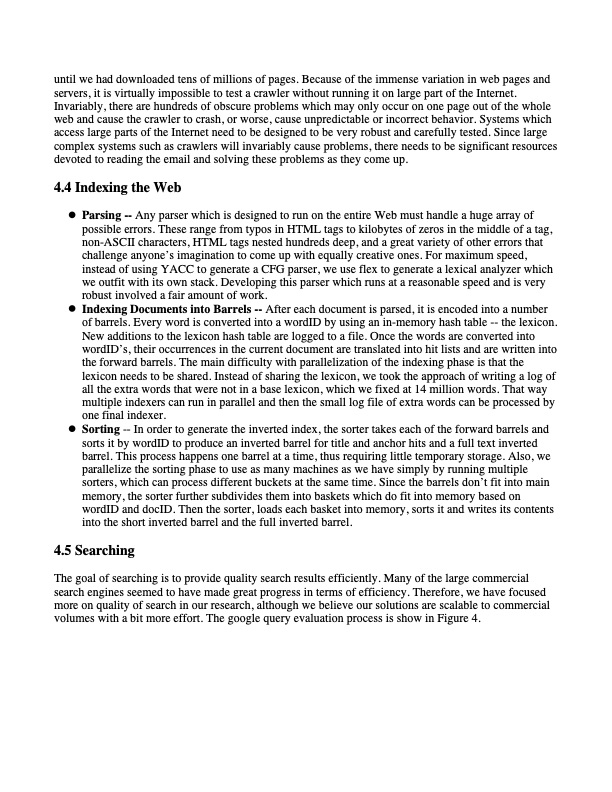
PDF Publication Title:
Text from PDF Page: 011
until we had downloaded tens of millions of pages. Because of the immense variation in web pages and servers, it is virtually impossible to test a crawler without running it on large part of the Internet. Invariably, there are hundreds of obscure problems which may only occur on one page out of the whole web and cause the crawler to crash, or worse, cause unpredictable or incorrect behavior. Systems which access large parts of the Internet need to be designed to be very robust and carefully tested. Since large complex systems such as crawlers will invariably cause problems, there needs to be significant resources devoted to reading the email and solving these problems as they come up. 4.4 Indexing the Web Parsing -- Any parser which is designed to run on the entire Web must handle a huge array of possible errors. These range from typos in HTML tags to kilobytes of zeros in the middle of a tag, non-ASCII characters, HTML tags nested hundreds deep, and a great variety of other errors that challenge anyone’s imagination to come up with equally creative ones. For maximum speed, instead of using YACC to generate a CFG parser, we use flex to generate a lexical analyzer which we outfit with its own stack. Developing this parser which runs at a reasonable speed and is very robust involved a fair amount of work. Indexing Documents into Barrels -- After each document is parsed, it is encoded into a number of barrels. Every word is converted into a wordID by using an in-memory hash table -- the lexicon. New additions to the lexicon hash table are logged to a file. Once the words are converted into wordID’s, their occurrences in the current document are translated into hit lists and are written into the forward barrels. The main difficulty with parallelization of the indexing phase is that the lexicon needs to be shared. Instead of sharing the lexicon, we took the approach of writing a log of all the extra words that were not in a base lexicon, which we fixed at 14 million words. That way multiple indexers can run in parallel and then the small log file of extra words can be processed by one final indexer. Sorting -- In order to generate the inverted index, the sorter takes each of the forward barrels and sorts it by wordID to produce an inverted barrel for title and anchor hits and a full text inverted barrel. This process happens one barrel at a time, thus requiring little temporary storage. Also, we parallelize the sorting phase to use as many machines as we have simply by running multiple sorters, which can process different buckets at the same time. Since the barrels don’t fit into main memory, the sorter further subdivides them into baskets which do fit into memory based on wordID and docID. Then the sorter, loads each basket into memory, sorts it and writes its contents into the short inverted barrel and the full inverted barrel. 4.5 Searching The goal of searching is to provide quality search results efficiently. Many of the large commercial search engines seemed to have made great progress in terms of efficiency. Therefore, we have focused more on quality of search in our research, although we believe our solutions are scalable to commercial volumes with a bit more effort. The google query evaluation process is show in Figure 4.PDF Image | natomy of a Large-Scale Hypertextual Web Search Engine

PDF Search Title:
natomy of a Large-Scale Hypertextual Web Search EngineOriginal File Name Searched:
google-anatomy-of-a-search-engine.pdfDIY PDF Search: Google It | Yahoo | Bing
Cruise Ship Reviews | Luxury Resort | Jet | Yacht | and Travel Tech More Info
Cruising Review Topics and Articles More Info
Software based on Filemaker for the travel industry More Info
The Burgenstock Resort: Reviews on CruisingReview website... More Info
Resort Reviews: World Class resorts... More Info
The Riffelalp Resort: Reviews on CruisingReview website... More Info
| CONTACT TEL: 608-238-6001 Email: greg@cruisingreview.com | RSS | AMP |